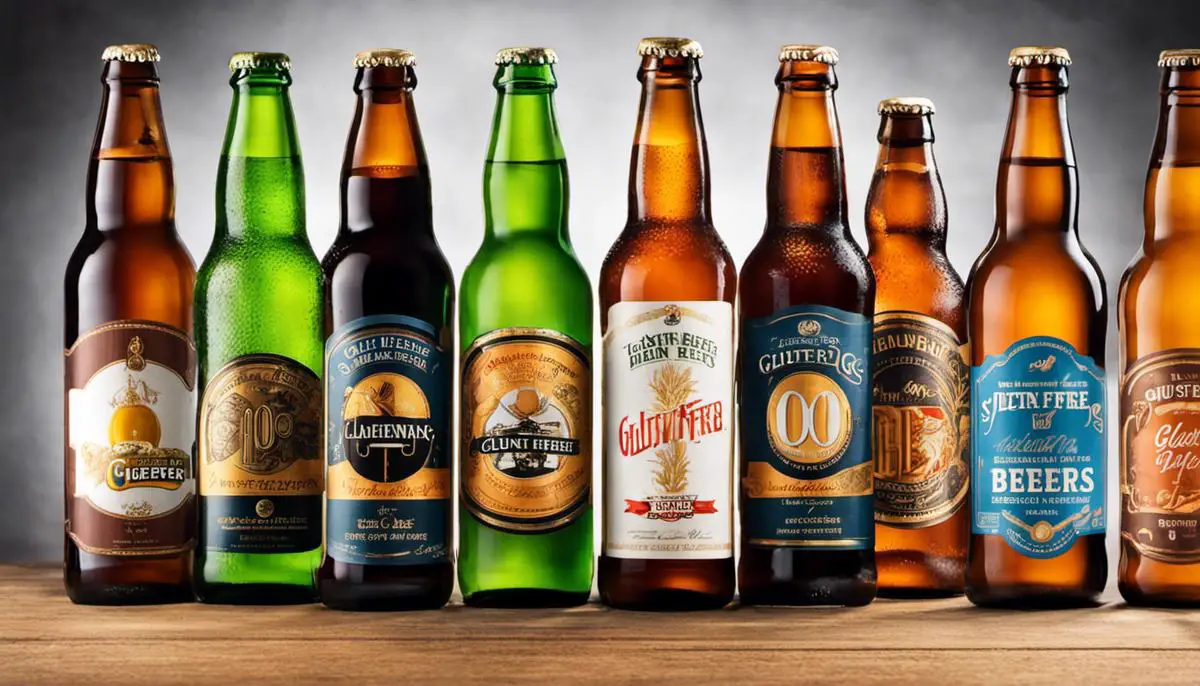The advent of gluten-free beers has marked a significant milestone in the brewing industry. The need to cater to consumers with dietary restrictions, particularly those with celiac disease or gluten intolerance, has led to the innovation of beers sans gluten.
This emerging market caters not just for health and dietary reasons, but also for individuals who simply prefer the unique flavor profiles derived from alternate grains. It is an invitation to explore a realm of beers brewed with non-traditional grains like millet, sorghum, corn, rice and even quinoa. Not merely an alternative, these brews have established a niche of their own, winning accolades and favor from beer enthusiasts across the globe.
Understanding Gluten-Free Beers

Understanding Gluten-Free Beers.
Gluten-free beers present an alternative to traditional brews, as they do not contain the protein gluten, which is found in wheat, barley, and rye. Regular beers are typically made from malted barley, which contains gluten. Gluten-free beers, on the other hand, are brewed with ingredients like sorghum, millet, corn, or rice that naturally do not contain gluten.
Difference Between Regular and Gluten-Free Beers.
The primary difference between regular and gluten-free beer is the grains used in the brewing process. Regular beers use barley, wheat, and rye, which all contain gluten. They contribute to the traditional taste and body of the beer. On the other hand, gluten-free beers are made using gluten-free grains such as sorghum, buckwheat, or millet. These alternatives can often result in different flavors and body characteristics.
In addition to the difference in ingredients, there’s also a difference in the brewing process. Brewers of gluten-free beers often use enzymes to break down any traces of gluten that might be present, ensuring the end product is safe for those with gluten sensitivities.
Why Choose Gluten-Free Beers?
There are several reasons why individuals choose gluten-free beers over regular ones. The primary reason is usually health-related. People with celiac disease, a serious autoimmune disorder, are unable to eat gluten because it will damage their small intestine. People with non-celiac gluten sensitivity also avoid gluten, as it causes symptoms like bloating, diarrhea, and constipation.
For such individuals, gluten-free beers are a great alternative as they can enjoy beer without worrying about the negative impacts on their health.
Even for those without a diagnosed gluten intolerance, some choose to lead a gluten-free lifestyle due to perceived health benefits. These individuals can also enjoy gluten-free beers as part of their dietary choices.
Gluten-Free Beers and Celiac Disease
Gluten-free beers play a significant role when it comes to people with celiac disease. The only known treatment for this autoimmune condition is a strict, life-long gluten-free diet. For beer lovers diagnosed with celiac disease, this could mean giving up on traditional beer. Thankfully, with the introduction of gluten-free beers, they can continue to enjoy their favorite beverage without causing harm to their body.
Gluten-Free Beers and Gluten Sensitivity
Non-celiac gluten sensitivity (NCGS) is a term used to describe individuals who cannot tolerate gluten and experience symptoms similar to those with celiac disease yet lack the same antibodies and intestinal damage. Gluten-free beers also cater to this group of people. As gluten-free beers are completely devoid of gluten, people with NCGS can sip these beers without triggering any unwelcome symptoms.
In essence, gluten-free beers are designed to be inclusive, catering not only to those with celiac disease or gluten sensitivity but also to individuals leaning towards health-conscious drinking. Their rise in popularity signals a broader change in the beer industry, spotlighting a move towards healthier drinking habits. The choice and accessibility of these beers have expanded impressively over recent years, offering wonderful options for those on a gluten-free diet or simply preferring the distinctive taste that these beers provide.
Ingredients and Brewing Process

Understanding the Ingredients in Gluten-Free Beers
The key ingredients of gluten-free beers are specifically selected grains and pseudograins which are naturally devoid of gluten, including sorghum, millet, buckwheat, rice, corn, and quinoa. The choice of grain is typically based on the desired taste and characteristics of the beer.
Sorghum is frequently the grain-of-choice in brewing gluten-free beers due to its adaptability and fairly neutral flavor. This grain is usually mixed with other ingredients to yield a blend of flavors.
Corn and rice are also popular components, used either independently or combined with other gluten-free grains. They contribute to a lighter body and gentle taste in the beer.
If brewers aim for a more distinguished, flavorful beer, they may opt for millet or buckwheat. While millet shares a family with corn and adds a sweet, nutty note, buckwheat imparts a rich, earthy essence to the beer.
Quinoa is another gluten-free grain often used in beer production, although its slightly bitter flavor may be more suited to certain styles over others.
Brewing Process for Gluten-Free Beers
The process of making gluten-free beer is very similar to that of traditional beer, but it requires some adjustments to account for the different characteristics of gluten-free grains.
The brewing process begins with malting the grains. This involves soaking the grains in water to start germination, then heating to stop the germination. The malted grain is then milled to break apart the kernels.
Next comes mashing, where the milled grain is mixed with hot water to convert the grain’s starches into fermentable sugars. The liquid resulting from this stage, known as wort, is then separated from the spent grain.
The wort is then boiled and hops are added for flavor and balance. The hops also act as a natural preservative.
Once boiling is complete, the wort is cooled and yeast is added. The yeast ferments the sugars in the wort, converting them into alcohol and carbon dioxide. This process, known as fermentation, takes one to two weeks.
The beer is then conditioned, or aged, for several weeks to allow any remaining yeast and sediment to settle. During conditioning, flavors continue to develop and any harsh alcohol tones are smoothed out.
Finally, the beer is filtered and carbonated, then packaged in kegs, bottles, or cans.
Embracing the Unique Character of Gluten-Free Beers
Creating a gluten-free beer that maintains the distinctive taste of traditional beer involves navigating a series of unique challenges. Due to the disparate flavors, textures, and fermenting capabilities of gluten-free grains compared to barley or wheat, brewers face an exciting task of inventiceness to achieve a flavor that mimics traditional beer.
Brewers often diversify their flavors utilizing additives such as honey, fruits, or molasses. The mastery of craft brewing techniques, harnessing modern Brewing technologies, and a commitment to continual innovation significantly contribute to enhancing the taste and quality of gluten-free beers.
While gluten-free beers inherently differ in flavor from traditional beers, many consumers find that they develop an appreciation for the unique taste profile of gluten-free beers. The on-going experimentation and innovation in gluten-free brewing promise a wider variety of delicious and high-quality gluten-free beers.
Popular Gluten-Free Beer Brands

Spotlight on Glutenberg Blond
Glutenberg Blond is a celebrated gluten-free beer from Canada’s acclaimed Glutenberg brewery. This gluten-free beer is characterized by its vibrant golden hue, accompanied by citrus notes and traces of floral undertones. This light-bodied beer offers a refreshing crispness, making it delightfully easy to drink. Instead of classic beer elements like wheat and barley, Glutenberg Blond is brewed using gluten-free alternatives such as millet, corn, and quinoa. The exceptional quality and flavor profile of Glutenberg Blond have earned it numerous awards, and consumers consistently commend the brewery’s dedication to crafting certified gluten-free beers.
Omission Lager
Omission Lager, brewed by Omission Brewing Co in Oregon, is a popular choice amongst gluten-free beer enthusiasts. It is crafted to reduce gluten content but doesn’t compromise on taste. This flavorful, golden lager features a traditional hoppy flavour which is well-balanced with a hint of sweet caramel. Consumers often commend it for its close resemblance to regular lagers, something which is often missing in other gluten-free beers.
Green’s Discovery Amber Ale
Belgian beer Green’s Discovery Amber Ale is a fantastic introduction to the world of gluten-free beers. Brewed with a unique mix of ancient grains like millet, sorghum, rice and buckwheat, this beer delivers a complex, full-bodied flavor. It offers a beautifully balanced taste with hints of caramel and fruity undertones. Despite being gluten-free, it manages to retain the richness and depth of traditional Belgian ales. This has garnered it many loyal fans who appreciate its rich flavor profile and lack of a stereotypical gluten-free aftertaste.
Epic Brewing Glutenator
Epic Brewing, based in Salt Lake City, brews the Glutenator, a gluten-free beer that has made waves in the gluten-free community. This beer replaces the traditional barley foundation of beer with a smooth sorghum base. The addition of brown rice, sweet potatoes and molasses adds to the beer’s unique flavor profile. Diversity of ingredients results in a tasty blend of fruity and savory notes. Customers often rave about the gluten-free status, and the blend of unexpected flavors making this beer stand out from the crowd.
New Planet Tread Lightly Ale
Colorado’s New Planet Beer Company specializes in creating gluten-free beers, and their Tread Lightly Ale has quickly become a fan favorite. Their blend harnesses the flavors of maize, orange peel, and coriander which delivers a refreshing, citrusy taste. Consumers are often quick to praise its light, clean flavor, and its balance between being distinct yet familiar.
With the rise of gluten-free beers on the horizon, some brands have made a name for themselves due to their distinctive flavors and their ability to recreate the typical beer-drinking experience found in their gluten-packed counterparts.
Health Implications

Understanding the Health Aspects of Gluten-Free Beers
As people become more diet-conscious and health-aware, gluten-free beers have steadily edged their way into popularity. These beers, though specifically designed for folks with celiac disease or a gluten intolerance, are finding favor amongst the wellness-focused demographic seeking a healthier or cleaner lifestyle. However, it’s critical to grasp the health aspects of drinking gluten-free beer before choosing to replace your regular alcoholic beverages with it.
Beneficial for People with Gluten Intolerance or Celiac Disease
The most significant health benefit of gluten-free beers lies within a core demographic: individuals with gluten intolerance, wheat allergies, or celiac disease. For these groups, having a gluten-free beer option, brewed from grains like millet, sorghum, buckwheat, or rice, can prevent the triggering of adverse immune responses, digestive distress, and other health complications associated with gluten consumption.
Effects on the General Population
For those without gluten-related health issues, the benefits of gluten-free beers are less clear-cut. In terms of general health impacts, some research suggests that gluten-free beers may have a slightly lower calorie count compared to traditional beers. However, the variation is minimal, and the health benefits of switching to gluten-free beer solely for calorie reduction are rather insignificant.
Potential Downside: Nutrient Compromise
One potential downside of gluten-free beers is the compromise on certain nutrients. Beers brewed with barley and wheat often contain selenium, fiber, and various B vitamins, which naturally occur in these grains. Gluten-free alternatives, especially those that are specifically designed to remove gluten, may lack these nutrients.
Expert Opinions and Studies
Most health professionals agree that unless diagnosed with gluten intolerance or celiac disease, there is no considerable health advantage in opting for gluten-free beers. A research published in the Journal of Human Nutrition and Dietetics stated that gluten-free diets (and by extension, gluten-free beers) are unnecessary for the general population and could even lead to nutritional deficiencies.
Not Just a Fad, But Not a Universal Solution
While gluten-free beers may seem like just another dietary fad, they play an essential role for those with gluten-related health issues. Still, they aren’t a universally preferable or healthier alternative to traditional beers. Consumption should be based on an individual’s specific dietary needs and health conditions.
Important Considerations
Before making a switch to gluten-free beers, it’s crucial to consult with a healthcare provider or a nutritionist. Not all gluten-free beer options are created equal; some are made with naturally gluten-free grains, while others are crafted from barley but undergo a process to remove or break down gluten. The latter may still contain trace amounts of gluten which some people may react to.
In consideration of the growing popularity of gluten-free diets, gluten-free beers have emerged as a healthy alternative, particularly important for consumers with gluten-related health concerns. However, for the majority of the population, these beverages offer a different set of flavors and experiences rather than significant health advantages. The decision to consume gluten-free beers should be guided by individual health needs, personal preference, and lifestyle considerations. And, as is the case with all alcoholic beverages, gluten-free beers should be consumed responsibly to promote good health.

Pairing Gluten-Free Beers
Digging Deeper into Gluten-Free Beers
Designed with celiac and gluten-sensitive individuals in mind, gluten-free beers are crafted from a varied range of ingredients. This includes grains like millet and sorghum along with alternatives such as rice, corn, and some types of gluten-free wheat. The diversity of these ingredients not only gives these beers their unique taste profiles, but also opens up new avenues for exciting and innovative food pairings, creating an enriching culinary journey.
Pairing Gluten-Free Lagers
Gluten-free lagers showcase a clean, crisp, and slightly malted profile. They’re lighter than other beer types and pair well with lighter foods such as salads, seafood, and chicken. Fried foods and spicy meals are also solid accompaniments due to the lager’s refreshing properties. For instance, a crisp lager would balance out a spicy Thai dish or enhance the flavor of a classic fish and chips meal.
Pairing Gluten-Free Ales
Ales are slightly richer and heavier than lagers, making them a perfect match for more robust dishes. The hoppy, full-bodied flavors of gluten-free ales perfectly complement grilled meats, burgers, or pizzas. Combine a flavorful ale with a hearty stew or chili to create a warming and indulgent meal – the nuances in the ale’s flavor profile can enhance the spices and hearty ingredients, providing a delicious contrast.
Pairing Gluten-Free Stouts and Porters
Gluten-free stouts and porters are dark, rich, and full-bodied, offering notes of chocolate, coffee, and roasted flavors. These beers are traditionally paired with rich, decadent desserts like chocolate truffle cake or a classic brownie. They also play well with braised meats or venison, as the strong flavors in the beer will not be eclipsed by the robustness of the meat. Additionally, Porters and stouts’ coffee notes match well with flavors in BBQ and smoked dishes.
Pairing Gluten-Free Fruit Beers
Fruit beers are light, refreshing, and have a sweeter profile due to the addition of various fruits during the brewing process. They are excellent accompaniments for lighter, sweeter dishes. For example, raspberry or peach-infused beers pair exceptionally well with desserts or salads featuring these fruits. A tart cherry beer will complement savory meals like duck or pork.
Pairing Gluten-Free IPAs
Gluten-free IPAs are defined by strong hop flavors with notes of citrus and pine. The boldness of IPA stands up to spicy foods, like Mexican and Indian cuisine. They also pair well with oily fish like salmon or rich, fatty foods; the bitterness of the beer balances the richness of the dish.
Final Considerations: Personal Preferences and Experimentation
While there are suggested pairings, beer and food pairing ultimately depend on personal preference and a willingness to experiment. Remember that the primary goal is to enhance enjoyment of both the beer and food. When in doubt, sample the beer first and consider its primary flavors. Is the beer sweet, bitter, rich, or light? Once you’ve identified the main characteristics, you can find a dish that suits these flavors – whether you want a complementary flavor profile or a contrasting one. Happy pairing!

Whether your ratio for opting gluten-free beers is health-driven or you are merely a curious consumer, the world of these specialist brews is as diverse and inviting as its traditional counterparts. Recognition and understanding of the brewing process, the popular brands available, the health implications associated with gluten-free beers and the cuisine pairings to enhance the experience, can enhance one’s appreciation for this innovation. As you embark on this journey of gluten-free beer exploration, remember, the enjoyment of a beer comes not only from its taste but also from the context, company, and the knowledge that enables an informed choice.

